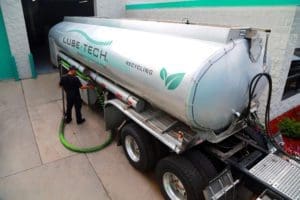
About 30 years ago, the Environmental Protection Agency (EPA) classified used oil as a regulated waste, meaning that used oil must be “recycled” and specifically prohibits any other type of disposal.
Today, a billion gallons of waste oil is collected every year, and four million gallons of that is collected by Lube-Tech. There are two general types of used oil — (1) crankcase oil; and (2) industrial oil. Each type presents a unique set of recycling challenges. For industrial oils, water typically needs to be removed before it can be recycled, and chlorine sources need to be verified to ensure it is not hazardous waste.
Where Does Industrial Oil Come From, and How is it Handled?
Most used oil comes from car, truck, and bus engines when the oil is changed. From an industrial side, cutting lubes, way lubes, machine oils, and other machining fluids (used to cool and lubricate tooling as it works the metal during the machining process) are the main sources of used oil. When industrial fluids reach the end of their lifespan, their disposal becomes a challenge. Unlike crankcase applications, industrial oils are typically chemically stabilized water and oil mixtures, known as emulsions. To be recycled, the emulsion must be broken down by removing the water.
Some manufacturers choose to do this on-site with an evaporator, which basically boils off the water into the atmosphere— leaving the oil and other waste accumulated from the manufacturing process to be recycled.
However, an on-site evaporator comes with challenges:
- a person is needed to run it and, in the current environment where staffing is often difficult, it may be hard to find someone to operate it, leaving the evaporator neglected or idle
- Evaporators are slow and often can’t keep up with the cyclical demand of a busy shop
- It takes up valuable space in the facility
- They consume a lot of energy
A second option, and one that simplifies the process dramatically for the manufacturer, is to have the oil hauled away to be recycled off-site. For example, Lube-Tech can pick up the used oil and remove it from your facility. The industrial oil or oily water is processed in four steps: (1) oil removal; (2) metals removal; (3) oil recovery; and (4) water discharge. This process is energy efficient, good for the environment, and compliant with all government regulations.
Uses for Recycled Oil
After the oil is collected, one of two recycling processes begins. Crankcase oil—such as that gathered by an automotive shop—as well as the oil separated from the industrial emulsion, will go through a “light process,” where the oil is filtered of non-soluble contaminants and de-watered in preparation for use as burner fuel. Burner fuel is rated at 135,000 BTU per gallon, about the same as diesel fuel. It is sold in bulk and typically is used to heat aggregate to produce asphalt.
Sometimes an auto service shop or other used oil generators will burn oil on-site to heat their facility. Drain oil can be burned as heating oil as it comes out of the vehicle. However, without filtering or de-watering, the user often will run into problems with the heating system due to contaminants in the oil.
Another process, called re-refining, prepares used oil for use in an engine or other machine, the same as originally intended. This process includes vacuum distillation to remove volatile contaminants (fuel) and hydrotreatment to remove impurities. One gallon of used oil typically results in a half-gallon of recycled base stock.
Oily Water Treatment & Chain of Liability
Once the emulsion in the industrial fluid is broken, the water left over is not suitable for disposal. Metals such as zinc, copper, and lead must be removed to get the water to an acceptable level. Although there are various ways to achieve this, Lube-Tech has developed a unique proprietary process to remove metals from oily water. Once this process is completed, the water is so clear of impurities that it can be safely discharged into city sewer systems.
Oily water disposal, like any regulated material, is an area in which a machine shop or manufacturer can run into trouble. Under regulatory requirements, a business is liable for the fluid from the time it is onsite until it is properly disposed of. So, even if someone else mishandles the waste of it leaves the site, the business is still held responsible, even though it followed all the regulations. To minimize risk, all parties that touch any waste after it leaves the site should be verified. Unfortunately, this can be difficult when working through brokers and out-of-state disposal companies.
One-Stop Recycling Service
Working with Lube-Tech, though, can lessen the stress and trouble of disposing of oily water. As a solutions-driven company, we’ll partner with you to supply fluids, analyze fluids, and dispose of them properly when they reach the end of their service life, taking liability worries away.
We offer oil recycling pick-up services across your shop to help you stay on top of regulations and avoid fines. Trust the lubricant experts to handle all your oil-related waste streams and help make your business more sustainable. We can also provide you with the drums, totes, tanks, and labels your shop needs for waste fluids.
Our full complement of recycling services includes:
- Used Oil & Coolant/Anti-freeze
- Used Filters
- Absorbents (Floor Dry & Pads)
- Waste Fuel (Diesel & Gasoline)
- Waste Grease
- Oily Water / Machine Coolants
- Flam Traps (Vacuum Truck Service)
To find out how we can help with your disposal and recycling needs, contact us.
